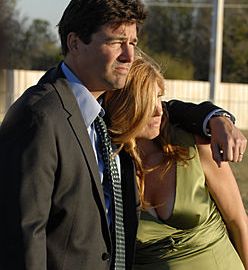The Last FRIDAY NIGHT LIGHTS

I’ve delayed my promised post on the the final episode of the instant classic TV show FRIDAY NIGHT LIGHTS in order to give you time to view it.
Sports, especially high school football, is one of the few areas of life free from both political correctness (or identity politics) and the materialistic rigors of productivity. Merit rules—merit defined in terms of the heart and skills of a warrior. So a show about small-town football is the perfect place to display what it means to be stuck with virtue today:
1. This episode in particular was about FAMILY—both “natural” (or biological) families and families formed by necessity and circumstances. The team, for example, is a family.
2. The episode (and the show as a whole) is very hard on Dillon—the small Texas town, the place. The evil oligarchs who really run the town decided to consolidate the two football teams (of the two high schools) into one incredibly well-funded and talent-laden team. Those evildoers gave no thought, of course, to the effect of the consolidation on unfortunate young men for whom the team is the only good and redeeming thing in their lives. They offered the COACH (Eric Taylor) the job of coaching that team.
3. In an earlier season, they had fired him as coach of the Dillon Panthers (a school with a rich tradition of football success and enthusiastic boosters), despite falling just short of winning the state championship. He was given, instead, the seemingly impossible task of building a new team at underclass East Dillon High, where he had virtually no resources. It takes the COACH just two years to develop greatness out of almost nothing. Not surprisingly, he says he’s more proud of that team than any other. (And, although he has the class not to say it, he’s hugely proud of the job he’s done there—success that’s made him a national legend and got him an offer as head coach from a major college.)
4.The COACH turns down the superteam job in large part because it’s about destroying the family that is his East Dillon team. It’s no challenge to win “state” with all the new advantages. Any decent coach could do it, and he proud of having done it without them. He also chooses for his biological family—especially his wife.
5. The COACH leaves Dillon (because the evildoers have left him nothing there). He follows his wife to Philadelphia, where she can fulfill her personal ambition as a counselor at an elite college. It’s pretty clear, immediately, that Philly and college are more her kind of places. And we see the COACH relishing the challenge of rebuilding an urban Philly team. He’s confident that his talent and virtue will display their transformative powers once again. He’s not limited in a way by the small-town horizon.
6. We learn that anyone (or almost anyone) with heart and brains has to get out of Dillon. The most intelligent and talented players (mostly the quarterbacks) do, and they too flourish, eventually, wherever they end up. There has been, it’s impossible not to notice, a brain drain from our small towns, due to globalization, economies of scale, and all that. The only thing left for a MAN to do for a living, it seems, is to be a mechanic or a teacher or a football coach (or maybe be in law enforcement). And the only way to display one’s moral and intellectual excellence is as teacher and coach: But the town leaders—themselves very short on talent and virtue—don’t even begin to appreciate such excellence in the coach and his wife. (The grateful students and players do, but only to some extent.) We also see, of course, that for most of the players the experience of the team and “state” (and the COACH) will be the highlight of their lives. Nothing they do thereafter will engage and challenge them as well as whole human beings.
7. So the show is, most of all, about the aristocracy of talent and virtue, about people who have been given extraordinary gifts and can do great good wherever they happen to be. The COACH is a man who chooses his words carefully. He speaks nobly and occasionally piously, and, when appropriate, with anger and a very restrained affection. His speech is as unvulgar as a coach—a leader of warriors—could conceivably be. He has class; he knows who he is and what he’s supposed to do. He’s more pagan than Christian; he’s almost a Stoic who doesn’t read books, some synthesis of Stoic and Spartan. He’s the very opposite of a racist; the players know he relates to them according to their capabilities and circumstances, and what’s noble and good—and what’s vicious and contemptible—about players and people in general has nothing to do with race. The coach has a bit of a problem with women, insofar as he little to do with students who aren’t on the team, and like all manly men he’s overprotective of his daughter. (His wife wonderfully compensates for his shortcomings in this area.) But he rather easily comes to appreciate that there’s that rare woman with the talent and heart to coach a footall team. And he and his wife, who, of course, have their “issues,” have a marriage that’s all about sharing the social responsibilities of personal excellence.
There’s a lot more to say, but this post is already too long.





